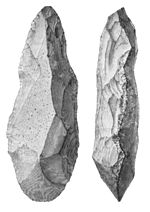Stone Age - Simple English Wikipedia, the free encyclopedia

The Stone Age was a prehistoric time when people made tools from stone such as flint. It began when people created the first stone tools about 3.3 million years ago.[1][2] About 99% of human history happened during the Stone Age. It lasted for about 3.4 million years,[3] and ended between 4,000 BC and 2,000 BC.
Stone Age people also made tools out of wood and bone. However, these materials do not last as long as stone. For this reason, most of the Stone Age tools archaeologists have found are made of stone.
Archaeologists divide the Stone Age into three sections: Palaeolithic ("old stone"), Mesolithic ("middle stone"), and Neolithic ("new stone").[4] During the Neolithic period, people invented farming and pottery, and started to care for animals like cows and pigs.
Sometime between 3000 BC and 2000 BC, people discovered the art of (making metals). This probably happened in the Middle East. People used copper first, then learned how to make bronze. When people started using these metals instead of stone, the Stone Age ended and the Bronze Age began.
Some groups of people in Papua New Guinea continued to use Stone Age technology into the 20th century. They used stone-tipped weapons to kill animals for food and clothing. They made shelters using animal skin.
Food that was eaten in the Stone Age was berries (e.g. blackberries), fish, animals (e.g. mammoth) and animal organs.
References
[change | change source]- ↑ Morelle, Rebecca 2015. Oldest stone tools pre-date earliest humans. BBC News Science & Environment. [1]
- ↑ Harmand, Sonia et al 2015. 3.3-million-year-old stone tools from Lomekwi 3, West Turkana, Kenya. Nature 521, 310–315. [2]
- ↑ "Oldest tool use and meat-eating revealed | Natural History Museum". 18 August 2010. Archived from the original on 18 August 2010.
- ↑ Nicholas Toth and Kathy Schick (2007). Handbook of Paleoanthropology. Springer Berlin Heidelberg. ISBN 978-3-540-32474-4. Archived from the original on 2020-04-13. Retrieved 2010-05-14.


 French
French Deutsch
Deutsch